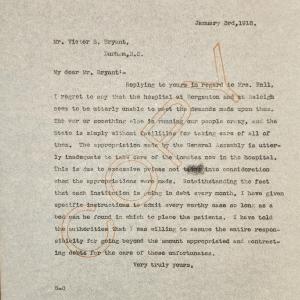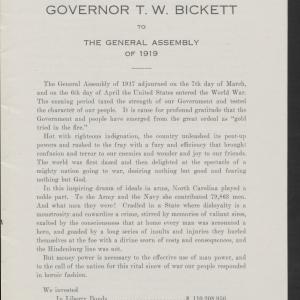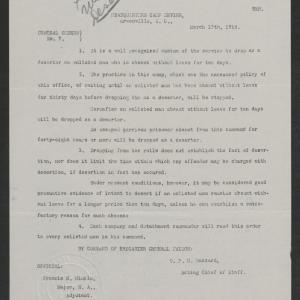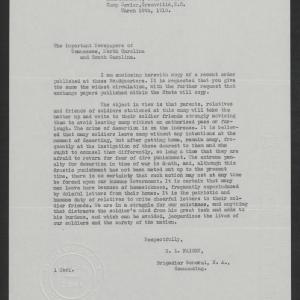- Transcription
August
Fifteenth
Nineteen eighteen
Hon. Lee S. Overman,
U. S. Senate,
Washington, D.C.
My dear Senator:
Your very courteous reception of the suggestions made in my letter of August 6th leads me to trespass on your attention once more. I am sure that you will receive this letter in the kindly spirit in which you have always considered any suggestions that I may see fit to make.
It seems to be evident that the Man Power bill, so far as the age limits are concerned, will pass, and I do not believe anything could be accomplished by opposing the main features of the bill, but I do think that a vast deal can be accomplished by your preparing an amendment in line with the suggestions contained in the 7th paragraph of my letter of August 6th, which paragraph I here repeat for the sake of your convenience:
“If Congress should deem it wise to require all men between ages of 18 and 45 to register, and should not deem it wise to limit the application of the law in the manner set out in the 6th paragraph of this letter, then I most earnestly urge upon your special attention the following plan:-
All persons brought within the purview of the Selective Service law by the amendment proposed by the War Department should be called to service in the following order, and this should be written in the law itself.
(1) All unmarried men between the ages of 31 and the highest age limite fixed by the law.
(2) All men between 21 and 20.
(3) All men between 20 and 19.
(4) All men between 19 and 18.
The law should very clearly stipulate that no registrants under 21 years of age shall be called until the registrants in Class one above 31 years of age are exhausted, and that no registrants less than 20 years old shall be called until all the registrants 20 years old and over in Class one are exhausted, and this order should be observed until the 18 year old registrants are reached.
I deem it of the utmost importance that the law should stipulate that no registrants under the proposed amendment shall be called until the President of the United States shall issue his proclamation to the people that the calling of these new registrants in a pressing military necessity, and this proclamation should be required with respect to each of the four classes above mentioned; that is, there should be a separate proclamation calling into service the men over 31, then the men over 20, then the men over 19, and then the men 18 years of age and over. The President is in touch with the civil population. He understands the necessities of civil life, and the people would have the utmost confidence that he would not call into service any of the class above named until they were actually needed for the successful prosecution of the war.”
I suggest that you prepare an amendment along these lines and take it direct to the President, and secure his approval of the amendment so that when you present it on the floor of the Senate you will be in a position to state that the amendment meets with the approval of the President. Of course, you may deem it wise to consult with Mr. Chamberlain and the Secretary of War also. This amendment would subtract nothing of the ultimate efficiency of the bill, as it would place all these men at the disposal of the Government whenever the Government really needs them. On the other hand, the amendment would add tremendously to the popularity of the bill amongst the people. The people are perfectly willing to send all the men to France that it is necessary to send, but they do not want these men called until they are necessary. It is no lack of confidence in either the wisdom or the integrity of the War Department to say that the people would prefer for the President to ay just when this necessity arises. The men at the head of the War Department are soldiers, war is their business, and there is a feeling that in order to provide an overwhelming military equipment men will be called who could well be left at home. This fear does not extend to the President. He is in touch with the needs of civil life, and the people understand that he is not going to disorganize the business of the country any more than is absolutely necessary for the successful prosecution of the war. I believe that if you will get right behind this amnedment you can put it over, and I know that it will be greeted with tremendous satisfaction by the people.
I sincerely hope that you will see fit to support the amendment offered by Senator Reed, making eligible for commissions in the army all volunteers or drafted men. I have heard a great many people say that the Government ought not to force a man into the army who is under 21 years of age and then, although he may be eminently qualified, refuse to grant him a commission becuase of the naked fact that he is under 21 years old. The feeling is that the boy ought to be allowed to get what he can.
I expect to be in Washington one day next week, and if so, I would very much like to hear the debate on this bill.
Sincerely yours,
[unsigned]
B-T
Date:
Sender:
Recipient:
Repository:
Collection:
Places:
»» »» Washington, D.C.







